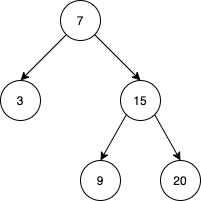Iterator for a Binary Tree (in C#)
For more that I'm falling in love with Python, C# still has a special place in my heart :)
This problem (LC, medium) asks to create an iterator for a Binary Tree, here it is: https://leetcode.com/problems/binary-search-tree-iterator-ii/
Implement the BSTIterator class that represents an iterator over the in-order traversal of a binary search tree (BST):
BSTIterator(TreeNode root)Initializes an object of theBSTIteratorclass. Therootof the BST is given as part of the constructor. The pointer should be initialized to a non-existent number smaller than any element in the BST.boolean hasNext()Returnstrueif there exists a number in the traversal to the right of the pointer, otherwise returnsfalse.int next()Moves the pointer to the right, then returns the number at the pointer.boolean hasPrev()Returnstrueif there exists a number in the traversal to the left of the pointer, otherwise returnsfalse.int prev()Moves the pointer to the left, then returns the number at the pointer.
Notice that by initializing the pointer to a non-existent smallest number, the first call to next() will return the smallest element in the BST.
You may assume that next() and prev() calls will always be valid. That is, there will be at least a next/previous number in the in-order traversal when next()/prev() is called.
Follow up: Could you solve the problem without precalculating the values of the tree?
Example 1:

Input ["BSTIterator", "next", "next", "prev", "next", "hasNext", "next", "next", "next", "hasNext", "hasPrev", "prev", "prev"] [[[7, 3, 15, null, null, 9, 20]], [null], [null], [null], [null], [null], [null], [null], [null], [null], [null], [null], [null]] Output [null, 3, 7, 3, 7, true, 9, 15, 20, false, true, 15, 9] Explanation // The underlined element is where the pointer currently is. BSTIterator bSTIterator = new BSTIterator([7, 3, 15, null, null, 9, 20]); // state is [3, 7, 9, 15, 20] bSTIterator.next(); // state becomes [3, 7, 9, 15, 20], return 3 bSTIterator.next(); // state becomes [3, 7, 9, 15, 20], return 7 bSTIterator.prev(); // state becomes [3, 7, 9, 15, 20], return 3 bSTIterator.next(); // state becomes [3, 7, 9, 15, 20], return 7 bSTIterator.hasNext(); // return true bSTIterator.next(); // state becomes [3, 7, 9, 15, 20], return 9 bSTIterator.next(); // state becomes [3, 7, 9, 15, 20], return 15 bSTIterator.next(); // state becomes [3, 7, 9, 15, 20], return 20 bSTIterator.hasNext(); // return false bSTIterator.hasPrev(); // return true bSTIterator.prev(); // state becomes [3, 7, 9, 15, 20], return 15 bSTIterator.prev(); // state becomes [3, 7, 9, 15, 20], return 9
Constraints:
- The number of nodes in the tree is in the range
[1, 105]. 0 <= Node.val <= 106- At most 105 calls will be made to
hasNext,next,hasPrev, andprev.
Easiest way, given that the boundaries are small (10^5), is to convert the tree to an array and just play with the indexation. Moving the tree to an array using In-Order traversal is actually very trivial - you can see the code below. Works fast - cheers, ACC.
public class BSTIterator
{
private int[] treeInArray = null;
private int currentIndex = 0;
public BSTIterator(TreeNode root)
{
List list = new List();
PopulateArray(root, list);
treeInArray = list.ToArray();
currentIndex = -1;
}
public bool HasNext()
{
return currentIndex < treeInArray.Length - 1;
}
public int Next()
{
return treeInArray[++currentIndex];
}
public bool HasPrev()
{
return currentIndex > 0;
}
public int Prev()
{
return treeInArray[--currentIndex];
}
private void PopulateArray(TreeNode node, List list)
{
if (node == null) return;
if (node.left != null)
{
PopulateArray(node.left, list);
}
list.Add(node.val);
if (node.right != null)
{
PopulateArray(node.right, list);
}
}
}




Comments
Post a Comment